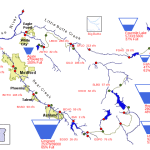Don’t neglect physical health during pandemic, medical experts say
ASHLAND, Ore. —Source KOBI For more than two weeks now, we’ve adjusted to the way things have changed during the coronavirus pandemic.
It can be easy to neglect certain things we may need, as our minds are focused on other things. But when it comes to taking care of our physical health, medical experts say that should be a top priority.
“People are not precluded, they’re actually encouraged to continue having a relationship with their physicians and to seek treatment when it might be medically necessary,” said Dr. Andy Kranenburg, Southern Oregon Orthopedics.
Dr. Kranenburg says he understands patients are nervous about catching the virus. Still, he says you can’t neglect other health concerns in which delayed treatment could lead to irreversible harm.
“Getting cuts that become infected or foreign bodies that get underneath the skin or in a joint… if those go untreated they can cause irreversible damage to the patient’s joints or tissues and even in some cases make patients septic or very sick,” he said.
Dr. Kranenburg says the Medford clinic can do virtual visits, phone calls, in-person visits, and even opened its first walk-in clinic last week.
“We have injection capability, we have imaging capability, we have full service casting and splinting technicians,” he said.
Taking care of your health needs also includes filling prescription medications and having a handy supply of over-the-counter drugs at home.
“People who are at high risk, asthmatics, diabetics, [or have] heart conditions… their medicine is more important than ever,” said Andy Benson, pharmacist at Ashland Drug.
Benson says they’re working with customers who need deliveries or curb side pick-ups.
“If you’re a diabetic, you want to have insulin for probably three months. If you have a heart condition you want to have your blood pressure medications or cardiac medications,” Benson said.
With the demand high, Benson says some supplies are running low everywhere, such as inhalers which can take a week or longer to refill.
Although he says there isn’t a shortage of drugs on store shelves, that doesn’t mean you shouldn’t plan ahead.
“We try to have people think ahead in, you know, earthquake emergencies, that sort of thing,” he said. “It’s a good idea to have at least a thirty day supply put away somewhere in those events where our supply chain is severed and we can’t provide it.”






